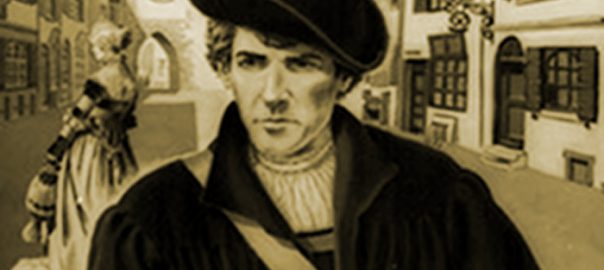
Is the human will free or unfree? Is there a third option? While Erasmus of Rotterdam (1466-1536) defended the idea that human beings have a free will to choose the good, Martin Luther (1483-1546) defended the Augustinian idea that the human will is determined by God, and is thus unfree: God is ‘absolute’ and ‘necessary’, and thus determines human beings who are ‘relative’ and ‘contingent’ (On the Bondage of the Will).
There is a third option, however. According to Luther’s contemporary Anabaptist reformer Hans Denck (1500-1527), both determinism (Luther) and anti-determinism (Erasmus) are, in themselves, true. But they are both lies too, says Denck, and both claims are used as an excuse for boasting, and for not wanting God get his will (Divine Order §7, p. 258).
To get to a true conception of the human will, determinism and anti-determinism must be reconciled. Denck’s strategy rests on his dialectical methodology, as explained briefly in his ‘Paradoxa’:
“Two opposites must both be true. But one is contained in the other, as the lesser is in the greater, time in eternity, finitude in infinity. One who leaves antitheses without reconciling them lacks the ground of truth.” (Paradoxa, p. 29)
Denck explains that there is a radical distinction between God and human beings. This means that when human beings rely on their own will they will always sin, even when they try to do good:
“There are essentially two, God and humankind. Since they are two, each one does what is appropriate to his nature, good and evil (Is. 55).” (Divine Order §5, p. 254)
God lets human beings feel the consequences of sin (separation from God), in order to teach us that we cannot rest on our own will. God is not the cause of sin (this would follow from determinism), but he uses what is apparently evil, as a means of salvation (Divine Order §5, p. 254). Salvation begins, says Denck, “when the Lord places us in the remotest part of hell.” (Divine Order §4, p. 253).
“When we are deepest in damnation we allow ourselves and everything that relates to us to us to be torn asunder with unspeakable pain […] This is the eye of the needle through which the uncouth camels have to pass, yet cannot. Indeed, we cannot do it ourselves but must suffer God to do it for us[…]” (Divine Order §6, p. 256)
To allow ourselves to be torn asunder is not a matter of exercising will, free or unfree, but of yielding to God. It is in this ‘yieldedness’ (Gelassenheit) that determinism and non-determinism is reconciled. It is this yieldedness that allows human beings to make the required ‘leap of faith’, to borrow a term from Kierkegaard, which is not a matter of exercising free will, but of letting God do what he wills (Denck, Whether God is the Cause of Evil).
This is why Denck can say in his confession that:
“all believers were once unbelievers. Consequently, in becoming believers, they thus first had to die in order that they might thereafter no longer live for themselves, as unbelievers do, but for God through Christ” (Denck, Confession)
We are, in other words, not saved from spiritual death but through the spiritual death which creates yieldedness.
I like Denck’s dialectical way of thinking, as he is clearly aware that God’s judgment and mercy are not separate things, but two sides of the same coin. The problem with his spiritualistic idea of Christ’s death and resurrection as something in which the believer participates by subjective experience is, of course, that it leaves Christ’s actual death on the cross ineffectual for the believer before faith. Here I clearly prefer e.g. Relly’s idea of union as “of old”, meaning that we have actually died with Christ in his death even before we come to subjective faith. Faith is the apprehension of our death with Christ on the cross, the result of union with Christ, rather than the condition of union. This also means that we were justified and even in some sense saved before we even had the chance to make a choice of faith. Our choice – free or unfree – can only be a matter of how we relate to the fact that we have already been reconciled to God through Christ. This, it seems to me, is a fourth option which is more Christocentric than Erasmus, Luther and Denck who all rely on some degree of subjectivism. Perhaps we could talk of faith as yielding to the facts?
Btw: Denck’s idea of yieldedness is not unique. Something similar can be found, e.g. in the Quaker theologian Robert Barclay a century later. The opposition between Erasmus and Luther is more or less similar to that between Calvinism (determinism) and Arminianism (anti-determinism), which Barclay sought to overcome in his thinking.
Read more about Hans Denck at Gameo.
Passages are quoted from ‘Selected writings of Hans Denck, 1500-1527’ [edited and translated by] E. J. Furcha: 1989.
